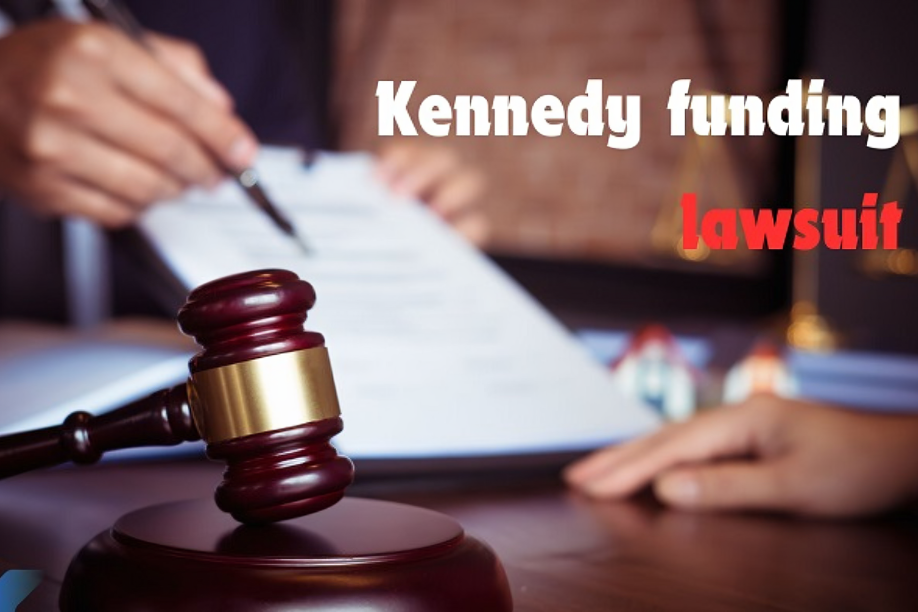
kennedy funding lawsuit
Introduction
Kennedy Funding, Inc. (KFI) is a well-known name in the commercial real estate loan sector, particularly recognized for its expertise in bridge loans. These short-term loans serve to “bridge” the gap between immediate financing requirements and long-term funding solutions, especially in complex and high-risk financing scenarios. However, KFI has been embroiled in legal controversies, most notably the lawsuit involving allegations of breach of contract and fraud brought by Virgil Shelton. This case shines a light on the critical importance of ethical practices and transparency within the lending industry.
Background of the Case
Detailed Description of the Initial Transaction Between Virgil Shelton and Willie Acklin:
The roots of the lawsuit trace back to a transaction in 1992 when Virgil Shelton sold the Rest in Peace Cemetery located in Hensley, Arkansas, to Willie Acklin, a local undertaker. To facilitate the sale, the deal was structured in a way that allowed Acklin to manage the purchase without the need for immediate cash payment. Shelton and Acklin agreed to a promissory note along with a mortgage, where Acklin committed to making various payments over time. This included both monthly installments and quarterly payments based on the cemetery’s income.
Initially, Acklin adhered to his payment commitments; however, by the late 1990s, he encountered financial difficulties stemming from a failed business expansion and tax issues with the IRS. Faced with these financial challenges, Acklin sought additional funding and approached Kennedy Funding, Inc. for a bridge loan to help restructure his finances and manage his debts.
Role of Kennedy Funding in the Bridge Loan Process:
Kennedy Funding, Inc. specializes in providing bridge loans designed to address immediate financing needs until more permanent solutions can be established. When Acklin reached out to KFI for a bridge loan, they agreed to provide funding with the cemetery as collateral. However, before proceeding, KFI required an Estoppel Certificate from Shelton, which would outline the remaining obligations on the mortgage. This document was essential for KFI to ensure that their loan would have priority over any existing obligations.
The negotiations surrounding the Estoppel Certificate proved to be contentious and complex, ultimately leading to legal disputes when Acklin defaulted on the loan.
Key Legal Issues
Breach of Contract:
The contractual agreement between Virgil Shelton and Willie Acklin was centered around a promissory note and a mortgage, where Acklin had the responsibility of making regular payments to Shelton while gaining ownership of the Rest in Peace Cemetery. As part of the bridge loan process, KFI required the Estoppel Certificate from Shelton to clarify any outstanding mortgage obligations. KFI consented to extend a loan of $2.2 million, contingent on the Estoppel Certificate indicating that the remaining mortgage value was $675,000.
The lawsuit alleged that KFI breached the contract by failing to adhere to the terms outlined in the Estoppel Certificate, particularly concerning the management of the escrow account that was intended to secure Shelton’s interests. This breach was a focal point of contention in the ongoing legal dispute.
Explanation of the Estoppel Certificate and Its Significance:
The Estoppel Certificate plays a crucial role in real estate transactions by outlining the obligations and rights associated with a property. It provides clarity to all parties involved regarding existing agreements. In this case, the certificate was meant to verify the amount owed to Shelton and to establish the conditions under which KFI could offer the bridge loan to Acklin. Disputes over the terms of the Estoppel Certificate and KFI’s adherence to them were central to the legal proceedings.
Fraud
Allegations of Fraudulent Practices by KFI:
Shelton accused Kennedy Funding, Inc. of engaging in fraudulent practices, which included making false representations about the loan terms and failing to disclose critical information that could influence the transaction. Specifically, KFI was alleged to have misrepresented the property’s value and the security of the loan agreement.
Details on False Representations and Nondisclosure of Material Facts:
The fraud claims focused on KFI’s alleged actions to inflate the property’s value and provide misleading information about the loan’s conditions. These actions purportedly led Shelton to agree to terms that were not in his best interest, resulting in financial losses. The nondisclosure of significant facts regarding the loan’s risks and the actual value of the property were pivotal points in the fraud allegations.
Unjust Enrichment and Conspiracy
Claims of Unjust Enrichment by KFI at the Expense of the Borrowers:
Shelton further asserted that Kennedy Funding, Inc. unjustly benefited from the financial arrangements at the expense of the borrowers. The lawsuit contended that KFI gained financially through unfair practices and breaches of agreed terms, ultimately causing financial harm to Shelton and other involved parties.
Allegations of Conspiracy Among Involved Parties:
The lawsuit also included claims of conspiracy, suggesting that KFI, along with other parties, collaborated to engage in unethical and possibly illegal activities. These allegations implied a concerted effort to manipulate the loan agreement and related transactions for the benefit of KFI and its associates, exacerbating the financial consequences for Shelton.
Court Proceedings and Key Rulings
Discovery and Pre-Trial Motions
Description of the Discovery Process and Exchange of Documents:
During the discovery phase of the Kennedy Funding lawsuit, both parties participated in an exhaustive exchange of documents and evidence. This included the gathering of financial records, emails, contracts, and other pertinent documents to bolster their respective claims. Depositions were conducted to gather testimony from key individuals involved in the case, including Virgil Shelton, representatives from KFI, and other relevant witnesses.
Summary of Pre-Trial Motions and Their Outcomes:
Both sides filed several pre-trial motions to address various legal issues prior to the trial. These motions encompassed requests to dismiss specific claims, motions for summary judgment, and motions aimed at excluding certain pieces of evidence. The court ruled on these motions, shaping the trial’s parameters by determining which claims and evidence would be admitted. While some motions were granted, narrowing the trial’s focus, others were denied, allowing critical issues to be thoroughly examined in court.
Trial and Verdict
Key Moments and Arguments Presented During the Trial:
The trial featured significant arguments from both sides. Shelton’s legal team concentrated on the alleged breach of contract and fraud, presenting evidence of KFI’s failure to uphold the Estoppel Certificate and accusations of misrepresentation. They contended that KFI’s actions had resulted in substantial financial harm for Shelton. In response, KFI’s defense challenged the enforceability of the Estoppel Certificate and disputed the fraud allegations.
Initial Verdict Awarding Shelton $1.675 Million:
Ultimately, the jury ruled in favor of Shelton, awarding him $1.675 million in damages. This verdict stemmed from the jury’s findings that KFI had breached the contract and engaged in fraudulent practices. The substantial financial award reflected the jury’s assessment of the impact of KFI’s actions on Shelton’s financial situation.
Appeal Outcomes
Details on the Appeal Process and Arguments:
Dissatisfied with the jury’s verdict, KFI opted to file an appeal. The appeal process involved presenting arguments to a higher court, challenging both the legal foundation of the jury’s decision and the amount of damages awarded. KFI contended that the Estoppel Certificate should not have been deemed enforceable under the Arkansas Statute of Frauds and that the evidence presented at trial failed to substantiate the fraud claims.
Outcome of the Appeal: Reduction of the Award to $675,000 and Dismissal of Fraud Claims:
Upon review, the appellate court issued a mixed ruling. While it upheld the finding of breach of contract, it reversed the jury’s verdict concerning the fraud claims, determining that the evidence was inadequate to support the fraud allegations. Consequently, the financial award to Shelton was reduced from $1.675 million to $675,000, reflecting only the damages related to the breach of contract. This ruling underscored the intricate legal issues involved in the case and resulted in a partial victory for both parties.
Implications of the Lawsuit
For Borrowers
Lessons on Due Diligence and Understanding Loan Agreements:
The Kennedy Funding lawsuit serves as a crucial reminder for borrowers about the importance of conducting thorough due diligence before entering into any loan agreement. It is essential for borrowers to have a comprehensive understanding of the terms and conditions of their loans, including any potential risks or obligations. This case illustrates how a lack of understanding and oversight can lead to significant financial and legal repercussions. Borrowers are encouraged to seek professional advice and meticulously review all loan documents to ensure they are fully aware of their commitments and rights.
For Lenders
Importance of Transparency and Adherence to Ethical Practices:
For lenders, this lawsuit emphasizes the necessity of maintaining transparency and ethical practices. The allegations of fraud and misrepresentation against Kennedy Funding, Inc. serve as a cautionary tale about the repercussions of unethical behavior. Lenders must ensure that all loan terms are clearly communicated and that they provide accurate information regarding the risks and values associated with the loans. Upholding these standards fosters trust with borrowers and helps prevent legal disputes that could harm a lender’s reputation and financial stability.
Industry Impact
Potential for Increased Regulatory Scrutiny and Changes in Industry Standards:
The broader ramifications of the Kennedy Funding lawsuit for the commercial lending industry may include heightened regulatory scrutiny. Regulatory bodies could respond to the issues exposed by this case by implementing stricter guidelines and oversight to mitigate the risk of similar disputes. This could lead to alterations in industry standards, encouraging more transparent and ethical lending practices. Lenders may need to adapt to these new regulations to ensure compliance and avoid legal and financial penalties.
Lessons Learned
Transparency and Ethical Conduct
Emphasis on the Need for Transparency in Financial Dealings:
A fundamental lesson from the Kennedy Funding lawsuit is the critical significance of transparency in financial dealings. Both lenders and borrowers benefit from open and honest communication, coupled with full disclosure of relevant information. This transparency helps to avert misunderstandings and disputes, cultivating a more trustworthy and secure lending environment.
Importance of Comprehensive Legal Understanding
Recommendations for Borrowers to Seek Legal Counsel Before Signing Agreements:
The necessity for borrowers to seek legal counsel prior to entering into loan agreements cannot be overstated. Understanding the legal implications and nuances of financial documents is vital to protecting one’s interests. Legal professionals can offer invaluable guidance in interpreting complex agreements, identifying potential risks, and negotiating favorable terms.
Vigilance in Documentation
Need for Thorough Documentation of All Transactions and Agreements:
The case also highlights the importance of maintaining meticulous records of all transactions and agreements. Both parties should document their communications and decisions to safeguard their rights and interests. This thorough documentation can serve as crucial evidence in the event of disputes, helping to clarify the intentions and commitments made throughout the transaction process.
Conclusion
The Kennedy Funding lawsuit serves as a critical case study within the commercial lending sector, providing essential insights into the importance of ethical practices, transparency, and due diligence. The outcomes of this case underscore the necessity for both borrowers and lenders to approach financial transactions with vigilance and integrity. As the industry evolves, the lessons learned from this lawsuit will undoubtedly shape future practices and foster a more accountable and transparent lending landscape.
FAQs
1. What is the Kennedy Funding lawsuit about?
The Kennedy Funding lawsuit involves allegations of breach of contract and fraud brought by Virgil Shelton against Kennedy Funding, Inc. (KFI). The case centers on a bridge loan transaction related to Shelton’s sale of a cemetery to Willie Acklin and the complications that arose during the loan process.
2. Who is Virgil Shelton, and what role did he play in the lawsuit?
Virgil Shelton is the plaintiff in the lawsuit, having sold the Rest in Peace Cemetery to Willie Acklin. He alleged that KFI breached the contract and committed fraud related to the terms of the loan and the Estoppel Certificate required for the financing.
3. What is a bridge loan, and how is it relevant to this case?
A bridge loan is a short-term loan that provides immediate funding until more permanent financing can be secured. In this case, KFI provided a bridge loan to Acklin for the cemetery, which became the center of the dispute when complications arose regarding the repayment and contractual obligations.
4. What is an Estoppel Certificate, and why was it significant in the Kennedy Funding lawsuit?
An Estoppel Certificate is a document that outlines the rights and obligations of parties in a real estate transaction. In the lawsuit, it was crucial for verifying the outstanding mortgage obligations on the cemetery, which KFI required before granting the bridge loan. Disputes over this document were central to the legal issues raised in the case.
5. What were the main allegations made against Kennedy Funding, Inc.?
Shelton’s lawsuit included allegations of breach of contract, fraud, unjust enrichment, and conspiracy. He claimed that KFI made false representations about the loan terms and failed to disclose critical information, leading to financial harm.
6. What was the outcome of the initial trial?
The jury initially ruled in favor of Virgil Shelton, awarding him $1.675 million in damages based on KFI’s breach of contract and fraudulent practices.
7. How did Kennedy Funding respond to the verdict?
Kennedy Funding filed an appeal against the jury’s verdict, contesting both the breach of contract ruling and the awarded damages.
8. What was the outcome of the appeal in the Kennedy Funding lawsuit?
The appellate court upheld the finding of breach of contract but reversed the fraud claims due to insufficient evidence. Shelton’s financial award was reduced to $675,000, reflecting only the damages related to the breach of contract.
9. What lessons can borrowers and lenders learn from the Kennedy Funding lawsuit?
The case emphasizes the importance of transparency, ethical conduct, and comprehensive understanding of loan agreements. Both borrowers and lenders should engage in thorough due diligence, maintain meticulous documentation, and seek legal counsel to protect their interests.
10. What impact might the Kennedy Funding lawsuit have on the commercial lending industry?
The lawsuit may lead to increased regulatory scrutiny and changes in industry standards, encouraging lenders to adopt more transparent and ethical practices. This case serves as a cautionary tale about the consequences of unethical behavior in the lending sector.
Uncover juicy celebrity rumors and entertainment updates on chicagoreader.blog.





